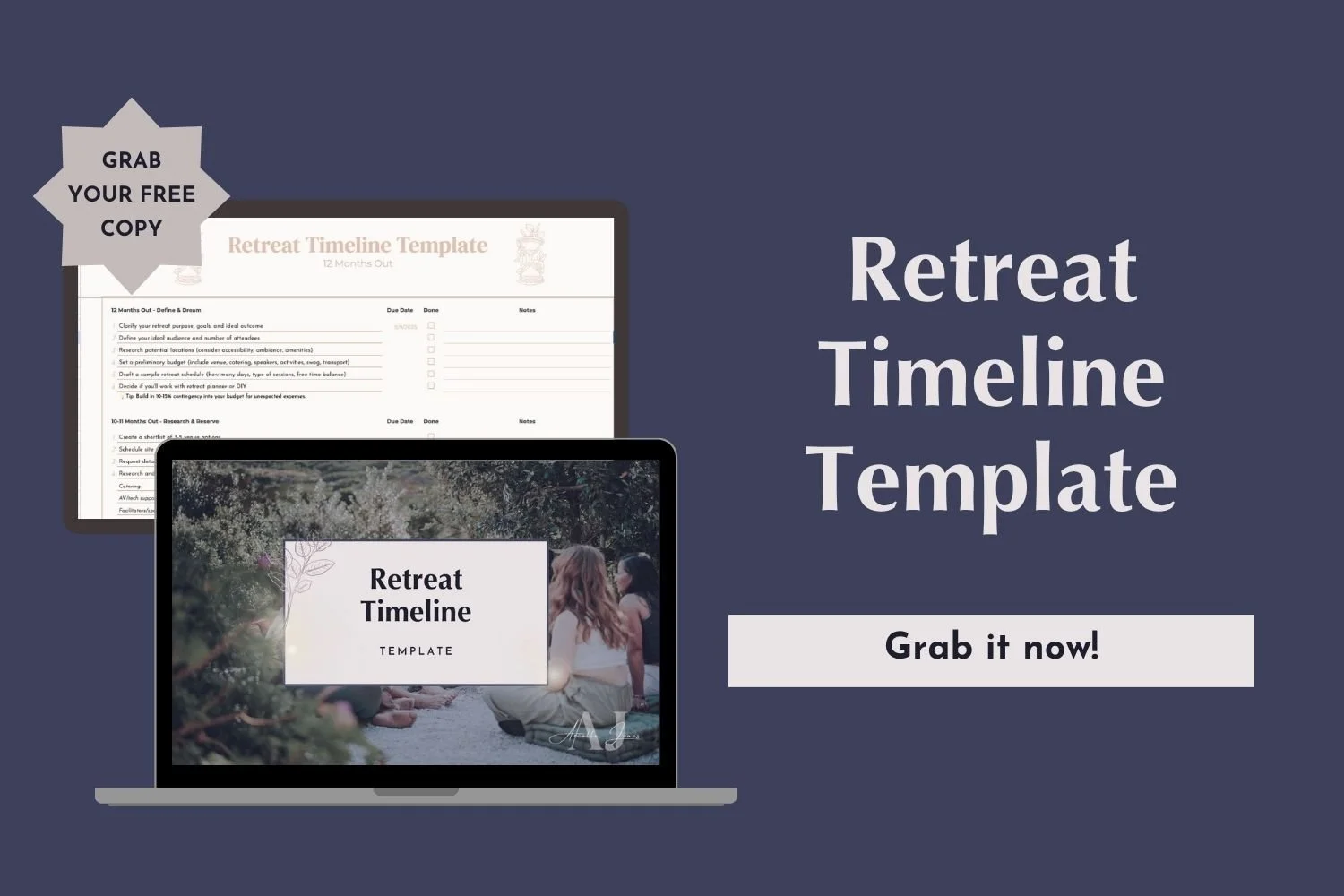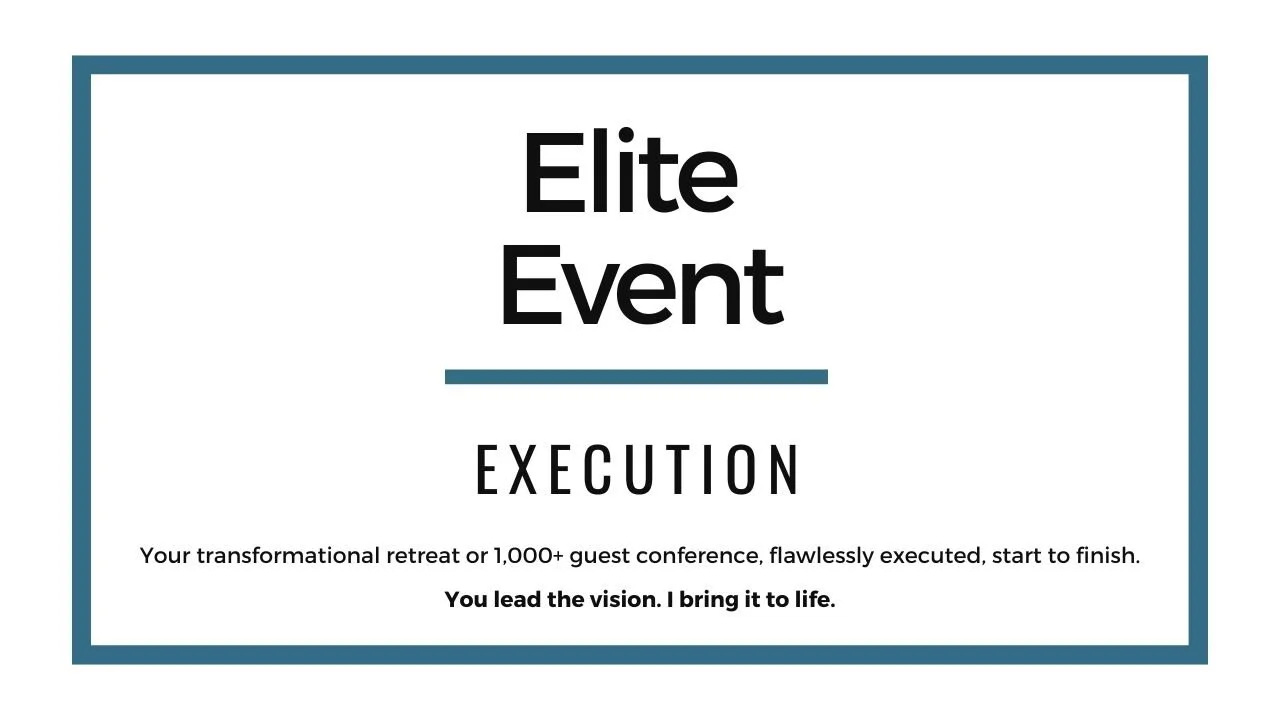Managing Retreat Vendors & Speakers: What Most People Overlook
When planning a retreat, choosing your vendors and speakers isn’t just another item to check off the to-do list… it’s a pivotal decision that can make or break the entire experience. You can have the perfect venue and beautifully planned agenda, but if the people helping you execute your vision aren’t aligned or prepared, things can fall apart quickly. In this post, I’m walking you through exactly how to vet, prep, and manage your vendors and speakers so they’re not just showing up, they’re fully equipped to deliver.
How to Vet and Manage Retreat Vendors & Speakers Like a Pro
Prefer to watch? The full breakdown is in the video below. Otherwise, let’s dive in.
Why Vetting Vendors is More Than Just a Checklist
Not every vendor who can technically do the job is the right person for your retreat. It’s not just about capability, it’s about alignment. You want people who respect your timelines, communicate clearly, and uphold your values. That means if you’re already noticing red flags like missed calls, late replies, or the need to constantly chase someone down for information, don’t brush it off. That’s not a fluke. It’s a preview of what’s to come.
The vendors you choose should protect your time, energy, and guest experience, not add more stress. If you find yourself questioning whether someone is the right fit, trust your gut. The issues you’re seeing now won’t disappear once the event begins.
Setting Expectations From the Start
Once you’ve selected your vendors, the real work begins. The way you communicate and manage that relationship sets the tone for the entire retreat. I’ve had events where the most frustrating part wasn’t the schedule or the attendees… it was chasing down vendors for answers they should’ve had days ago.
Here’s what I want you to remember: You are the client.
You have every right to follow up, to be clear about your expectations, and to escalate when necessary, respectfully, but firmly. Back when I worked in corporate, I sometimes played the “good cop” while my boss played the “bad cop,” not to cause tension, but to protect the process and keep things on track.
And here’s another little secret: build rapport early. A little mutual respect, consistent communication, and clear expectations can go a long way in turning a vendor into a true partner. When they feel like part of the team, they show up with more care and investment.
Give Vendors the Tools to Succeed
After booking a vendor, your job isn’t done. A contract is just the beginning. They need specifics:
Clear load-in times
Access details
Updated agendas
Key contact information
And more…
I use a logistics document that’s tailored specifically to what vendors need, no extra fluff, no distractions, just the key information they require to do their jobs.
This document is especially important for AV teams and venues. But simply sending it once isn’t enough. I follow up to confirm they received and understood it, send updates when the agenda shifts, and book a call when email doesn’t cut it. You do not want to be the person chasing down a vendor the day before your event because they don’t know where to park. That’s completely avoidable!
My advice? Over-communicate. Assume nothing. Clarity now prevents chaos later.
Speaker Prep is So Much More Than a Time Slot
Now let’s talk about the speakers… an area that’s often overlooked when it comes to event prep. Too many hosts send over a session title, assign a time slot, and consider it done. But your speakers need more than that if they’re going to truly contribute to your guest experience.
Give them context. Let them know the full event schedule, who else is speaking (especially for panels), their rehearsal times, and who they can contact with questions. Don’t underestimate the power of a warm welcome, either. They’re giving you their time, energy, and presence. Show them they’re valued.
Personally, I keep a speaker logistics tracker that includes everything: travel info, bios, headshots, session topics, contact details, you name it. Each speaker also gets a personalized welcome packet with key details for when they arrive on site. If managing that kind of detail sounds overwhelming, you can learn more about the Speaker Logistics Suite, which will simplify the entire process.
Why Shared Systems Are the Secret Weapon
Even with the best vendors and most prepared speakers, it can all fall apart if you’re the only one holding all the information. That’s why centralizing your logistics is a non-negotiable for me. Whether it’s a shared folder, timeline, or custom document, giving your team and partners direct access to what they need (and only what they need) keeps things moving without bottlenecking at you.
But it only works if you keep it updated. Every time something changes, make sure your vendors and speakers are aware and not just by hoping they check their inbox. Be intentional with your communication.
You shouldn’t be the one answering every question or relaying every update. When your systems are clear and accessible, your event starts to run like a well-oiled machine, and you can finally breathe.
Final Thoughts
Managing a retreat doesn’t mean micromanaging every detail yourself. When you choose the right vendors, prepare your speakers thoughtfully, and give your team the tools and systems they need, your event becomes easier, smoother, and more enjoyable for everyone, including you.
Learn more about the Speaker Logistics Suite if it sounds like something you need.
You’ll also love…
How to Successfully Execute a Retreat After the Planning Is Done
Delegate Like a Leader: What Not to Take On When Running a Retreat
Why Your Retreat Launch Isn’t Working, And What to Do Instead
How to Create an Aligned, Trust-Building Retreat Journey from Start to Finish
Plan Your Next Retreat Like a Pro: The Milestone-Based Timeline You Need



